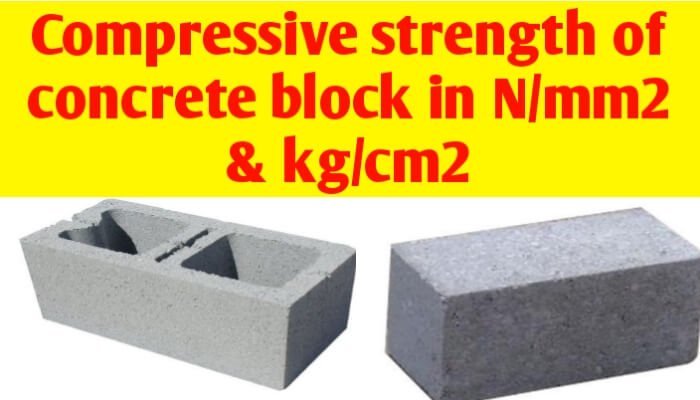The compressive strength of concrete blocks is typically measured in units of pressure, such as N/mm² (Newtons per square millimeter) or Kg/cm² (Kilograms per square centimeter). Common compressive strength values for concrete blocks can range from around 3 N/mm² to 40 N/mm², which is approximately 30 Kg/cm² to 400 Kg/cm².

Concrete is made of cement sand and suitable aggregate and it may be converted into precast masonry unit or concrete masonry unit or CMU such as hollow and solid normal, light and denser weight concrete block of suitable size used for load bearing and non load bearing units for house construction, retaining wall security barriers etc.
Concrete masonry unit in short form represented as CMU made of concrete, mixture of cement, sand and water. There is a form of concrete masonry unit concrete block, concrete bricks, hollow concrete block, solid concrete block, lintel block, concrete stretcher block, concrete pillar blocks, partition concrete block, corner concrete block, concrete pillar block.
◆You Can Follow me on Facebook and Subscribe our Youtube Channel
You should also visits:-
1)what is concrete and its types and properties
2) concrete quantity calculation for staircase and its formula
Concrete block serve as economic building material, using in those region where wall bricks are costly, poor in strength and not available. There is a wide range of Construction application for many types of Residential, Public and industrial building. Due to sturdy and long lasting building material, architect and Engineer will recommended for house construction, retaining wall, security barriers etc and this is best choice.
Compressive strength of concrete block is tested by compressive testing machine commonly known as CTM machine by taking full size of 8 blocks.
What is the compressive strength of concrete block in N/mm2 and Kg/cm2
Compressive strength of concrete block as IS code:- As per IS : 2185 (Part I) – 1979, the min. average (of 8 samples) compressive strength is 5 MPa, with individual value not lesser than 4 MPa and As per IS : 2185 (Part II) – 1983, (Light Wt.) the min. average (of 8 samples) compressive strength is 12.5 MPa, with individual value not lesser than 10.8 MPa
Strength of concrete block depend on the mix proportions of concrete, properties of ingredients of concrete, curing period, its physical dimension and how it is loaded (flat or on edge), solid or hollow, wall thickness and height (slenderness ratio), unsupported (lateral) length of wall, no. of openings, grove cuttings (electric counduits and plumbing works), type of mortar and masonry bond type.
There is different types, shape, full & half size of concrete blocks, it may be hollow, solid, ulta low density, light weight, normal and medium dense, denser, load- bearing or non- load bearing concrete block or CMU unit, depending on their nature, on average compressive strength of concrete block/ Cinder block or CMU is vary between 3.5N/mm2 to 17.5N/mm2 or 35kg/cm2 to 175kg/cm2.
For ultra low density weight concrete block, non-load bearing, hollow or solid, their compressive strength is about 3.5N/mm2 or 35kg/cm2.
For light weight concrete block, non-load bearing, hollow or solid, their compressive strength is about 7.5N/mm2 or 75kg/cm2.
For normal, medium weight concrete block, load- bearing, hollow or solid, their compressive strength is about 12.5N/mm2 or 125kg/cm2.

For denser, higher weight concrete block, load- bearing, hollow or solid, their compressive strength is about 17.5N/mm2 or 175kg/cm2.
◆You Can Follow me on Facebook and
Subscribe our Youtube Channel
Full & half size of concrete blocks, it may be hollow, solid, ulta low density, light weight, normal and medium dense, denser, load- bearing or non- load bearing concrete block or CMU unit, on average, compressive strength of concrete block is vary between 7.5N/mm2 to 12.5N/mm2 or 75kg/cm2 to 125kg/cm2, for non load bearing structure, their compressive strength is 7.5N/mm2 or 75kg/cm2 and for load bearing structure, their compressive strength is 12.5N/mm2 or 125kg/cm2.
ALSO READ :-
How much do cinder blocks weight (4″, 6″, 8″, 10″ & 12″)
How much does a concrete block weight (4″, 6″, 8″, 10″ & 12″)
Compressive strength of concrete block in N/mm2 and Kg/cm2
Block wall calculation | Find how many blocks you need
Conclusion:-
● For ultra low density hollow or solid, non- load bearing concrete blocks, their minimum compressive strength is 3.5N/mm2 or 35kg/cm2.
● For denser, higher weight, hollow or solid, load bearing concrete blocks, their maximum compressive strength is 17.5N/mm2 or 175kg/cm2.
● For normal, medium weight, hollow or solid, load bearing concrete blocks, their compressive strength is 12.5N/mm2 or 125kg/cm2.
● For normal, medium weight, hollow or solid, concrete blocks, on average, their standard compressive strength is vary between 7.5N/mm2 to 12.5N/mm2 or 75kg/cm2 to 125kg/cm2.